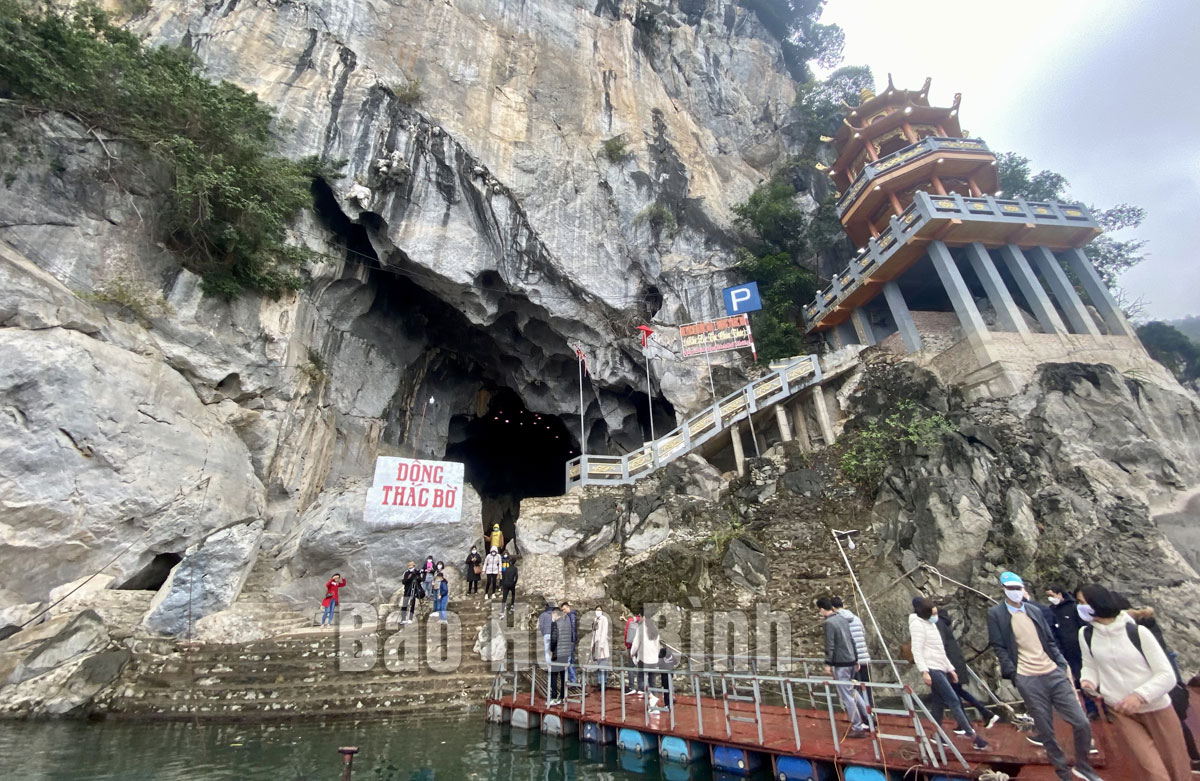
(HBO) - Thac Bo Cave is not only an attractive site of spiritual tourism in the festive season but also a renowned destination in tours of the Da River reservoir.

Thac Bo Cave in Suoi Hoa commune (Tan Lac district) is an
attractive destination for both Buddhist pilgrims and tourists.
Located in Bung hamlet, Suoi Hoa commune, Tan
Lac district, Thac Bo allows tourists to let their imagination run wild among
stalactites and stalagmites.
During the dry season, visitors must climb
nearly 100 stone stairs from the foot of the mountain to enter the cave. During
the flood season, boats carry visitors straight to a floating bamboo dock that
runs roughly 50 metres to the cave entrance. From the entrance, tourists can
look over the Da River, mountains and forests.
Dinh Son Tung, head of the district’s Culture
and Sports Bureau, said locating 100m deep in the mountain, the unique cave was
formed tens of thousands of years ago and divided into three areas, with the
first resembling a big living room. Thac Bo Cave holds a wonderful sight with
stalactites of all sizes and shapes – some look like carps, others look like a
tree, an umbrella, or a gong of the Muong ethnic group.
Many have even dubbed the cave as a giant
lithophone with its sounds created by mineral-rich water seeping down to the
stalactites.
The stalactites also pile up to form an altar
measuring about 50m high where people worship the Buddha. Stone pillars
naturally growing in the cave look like statues of the Buddha.
Visitors to Thac Bo pray for good luck, good
health and peace and explore the natural scenes.
There is a long list of nearby attractions that
visitors can add to their trip, such as the Ba Chua Thac Bo Temple, Trach
stream, Ngoi Hoa Cave and local ethnic villages like Ngoi and Muong Giang Mo.
Visitors should also take the chance to explore
special culture and delicacies of the Muong group./.
Spanning thousands of hectares and winding gracefully along mountain slopes, hillsides, and riverbanks, the terraced rice fields of Lac Son District present a stunning and captivating beauty. This region, renowned for its remarkable terraced landscapes, is also the centre of Hoa Binh Culture known for numerous archaeological sites.
The life of Mong people in Hang Kia and Pa Co communes of Mai Chau district has improved much thanks to tourism development.
The man-made Hoa Binh Lake, with a water surface area of approximately 9,000 hectares and a capacity of 9.45 billion cubic meters, stretches over 200 kilometers from Hoa Binh to Son La provinces. With the goal of developing into a national tourism area, the Hoa Binh Lake tourism area is expected to not only become the largest tourism centre in the province but also one of the 12 key tourist destinations in the northern midland and mountainous region of Vietnam.
Da Bia hamlet, now Duc Phong, in Tien Phong commune, Da Bac district, was once almost isolated from the outside as the only way to the hamlet was to get a boat ride across the Hoa Binh reservoir. However, as its tourism potential has been unleashed, the hamlet has established itself as one of the most attractive destinations on the tourism map. It has even received the ASEAN Community-Based Tourism Awards in 2019.
In the first 9 months of 2024, Mai Chau district, Hoa Binh province welcomed over 684 thousand visitors to visit and relax. In which, over 516 thousand domestic visitors and more than 168 thousand international visitors. Total revenue from tourism is estimated at over 821 billion VND.
Da Bac district, bestowed with stunning landscapes, is developing ecological and resort tourism offerings. Several tourist sites, put into operation this year, has attracted throngs of high-spending and young domestic visitors.



